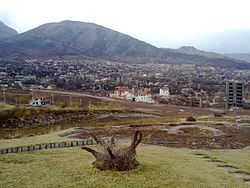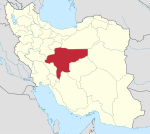Qamsar
Qamsar
قمصر | |
|---|---|
City | |
 A view from Qamsar | |
| Coordinates: 33°44′38″N 51°24′57″E / 33.74389°N 51.41583°E | |
| Country | |
| Province | Isfahan |
| County | Kashan |
| Bakhsh | Qamsar |
| Population (2016 Census) | |
| • Total | 3,877 [1] |
| Time zone | UTC+3:30 (IRST) |
| • Summer (DST) | UTC+4:30 (IRDT) |
Qamsar (Persian: قمصر, also Qamşar, Ghamsar and Kamsār)[2] is a city in central Iran. It is the administrative centre of the Qamsar District, which forms part of Kashan County is 15 km south of Kashan in the Province of Isfahan. In the 2006 census the population was 3,566, in 1,048 families.[3]
From the 13th century and possibly considerably earlier, cobalt was mined near Qamsar. The metal oxide was exported all over the Muslim world for use as the cobalt blue pigment in the decoration of pottery. It is possible that the cobalt ore was also exported to China.[4] In 1301 Abū'l-Qāsim, who came from a family of tilemakers based in Kashan, wrote a treatise on the manufacture of fritware ceramics in which he mentions the village as a source of cobalt ore.[5] Albert Houtum-Schindler visited the village at the end of the 19th century when Qamsar was "a large and flourishing village of about three hundred houses with extensive gardens with fine roses used for the manufacture of rosewater."[6] He described the processing and marketing of the cobalt containing ore.

Ghamsar is host to one of the biggest festivals of Iran called Golabgiri to produce Rose water in spring .
Qamsar is the biggest center in the Middle East in production of rose water[citation needed]. The Kaaba in Mecca is annually washed by Qamsar rose water.[citation needed]
References
- ^ https://www.amar.org.ir/english
- ^ Qamsar can be found at GEOnet Names Server, at this link, by opening the Advanced Search box, entering "-3079465" in the "Unique Feature Id" form, and clicking on "Search Database".
- ^ "Census of the Islamic Republic of Iran, 1385 (2006)" (Excel). Statistical Center of Iran. Archived from the original on 2011-09-20.
- ^ Kerr, Rose; Wood, Nigel (2004), Science and Civilisation in China Volume 5. Part 12, Ceramic Technology, Cambridge: Cambridge University Press, pp. 658–692, ISBN 0-521-83833-9.
- ^ Allan, J.W. (1973), "Abū'l-Qāsim's treatise on ceramics", Iran, 11: 111–120, JSTOR 4300488.
- ^ Houtum-Schindler, Albert (1897), Eastern Persian Irak, London: Royal Geographical Society, J. Murray, p. 114. Available from Google books but full view only available in the US.
Further reading
- Matin, Moujan; Pollard, Mark (2015). "Historical accounts of cobalt ore processing from the Kashan mine, Iran". Iran: Journal of the British Institute of Persian Studies. 53 (1): 171–183. doi:10.1080/05786967.2015.11834755.


